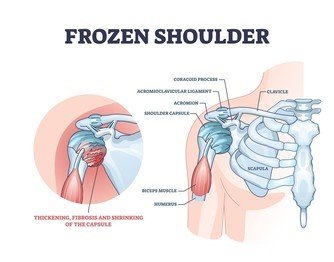Frozen shoulder, also known as adhesive capsulitis, is a painful and debilitating condition characterized by stiffness and limited range of motion in the shoulder joint. While the exact cause of frozen shoulder remains unclear, recent research has shed light on potential mechanisms and effective management strategies. In this article, we will explore the latest research findings and advancements in the management of frozen shoulder, including innovative treatments and interventions.
Understanding Frozen Shoulder: A Brief Overview

Before discussing the latest research and advances in frozen shoulder management, let’s review the basics of this condition. Frozen shoulder typically develops gradually and progresses through three stages:
Freezing Stage: Characterized by increasing shoulder pain and stiffness, often worsened at night.
Frozen Stage: In this stage, shoulder stiffness becomes more pronounced, limiting the range of motion and causing difficulty with daily activities.
Thawing Stage: Symptoms gradually improve, and the range of motion begins to return, although it may take several months to years to fully resolve.
Risk Factors for Frozen Shoulder:
- Age: Middle-aged adults, particularly women, are at higher risk.
- Diabetes: People who have diabetes have an increased risk of having a frozen shoulder.
- Shoulder Immobilization: Prolonged immobilization of the shoulder joint, such as after surgery or injury, can increase the risk.
- Other Medical Conditions: Certain medical conditions, such as thyroid disorders and cardiovascular disease, may predispose individuals to frozen shoulder.
Recent Research Findings on Frozen Shoulders
Recent studies have contributed to a better understanding of the underlying mechanisms and risk factors associated with frozen shoulder. Key research findings include:
- Inflammatory Pathways: Evidence suggests that inflammation plays a central role in the development of a frozen shoulder, leading to the thickening and contraction of the shoulder joint capsule.
- Biomechanical Factors: Abnormal shoulder biomechanics and muscle imbalances may contribute to the onset and progression of frozen shoulder.
- Genetic Predisposition: Some individuals may have a genetic predisposition to developing a frozen shoulder, although further research is needed to elucidate specific genetic markers.
Advances in Frozen Shoulder Management
1. Multimodal Pain Management:
- Medication: Nonsteroidal anti-inflammatory drugs (NSAIDs) and analgesics can help relieve pain and inflammation associated with a frozen shoulder.
- Corticosteroid Injections: Intra-articular corticosteroid injections have been shown to provide short-term pain relief and improve shoulder function in some patients.
2. Physical Therapy and Rehabilitation:
- Stretching Exercises: Gentle stretching exercises can help improve shoulder mobility and flexibility.
- Strengthening Exercises: Targeted strengthening exercises for the shoulder and surrounding muscles can enhance stability and function.
- Manual Therapy: Techniques such as joint mobilization and soft tissue massage may help alleviate pain and improve range of motion.
3. Minimally Invasive Interventions:
- Ultrasound-Guided Hydrodilatation: This procedure involves injecting a sterile saline solution into the shoulder joint to stretch the capsule and improve the range of motion.
- Manipulation Under Anesthesia (MUA): MUA is performed under sedation, during which a healthcare provider manipulates the shoulder joint to break up scar tissue and improve mobility.
Best Pain Specialist in North Delhi: Expert Care for Frozen Shoulder Pain
Residents of North Delhi can seek expert care for frozen shoulder pain from the Best Pain Specialist in North Delhi. These highly skilled physicians specialize in pain management techniques tailored to individual patient needs, offering compassionate care and innovative treatment options for conditions such as frozen shoulder. With their expertise and dedication to relieving pain and restoring function, pain specialists in North Delhi provide patients with comprehensive care and support throughout their recovery journey.
Pain Physician in North Delhi: Comprehensive Pain Management Solutions
For patients in North Delhi seeking comprehensive pain management solutions for frozen shoulder, a Pain Physician in North Delhi is an invaluable resource. These physicians are trained in the latest pain management techniques and interventions, including medications, injections, and physical therapy modalities, to alleviate pain and improve the quality of life for patients with frozen shoulders. With their multidisciplinary approach and commitment to patient-centered care, pain physicians in North Delhi empower patients to regain function and mobility despite the challenges posed by frozen shoulders.

Conclusion
Recent research and advancements in frozen shoulder management have led to a deeper understanding of the condition’s underlying mechanisms and innovative treatment approaches. From multimodal pain management strategies to minimally invasive interventions, patients with frozen shoulders now have access to a wide range of options for relieving pain and improving shoulder function. By seeking care from experienced pain specialists and physicians trained in the latest techniques, individuals affected by frozen shoulder can receive comprehensive treatment and support tailored to their unique needs, ultimately enhancing their quality of life and facilitating a smoother recovery process.
For any further queries, Plz visit drsmitagulatipainrelief.com



